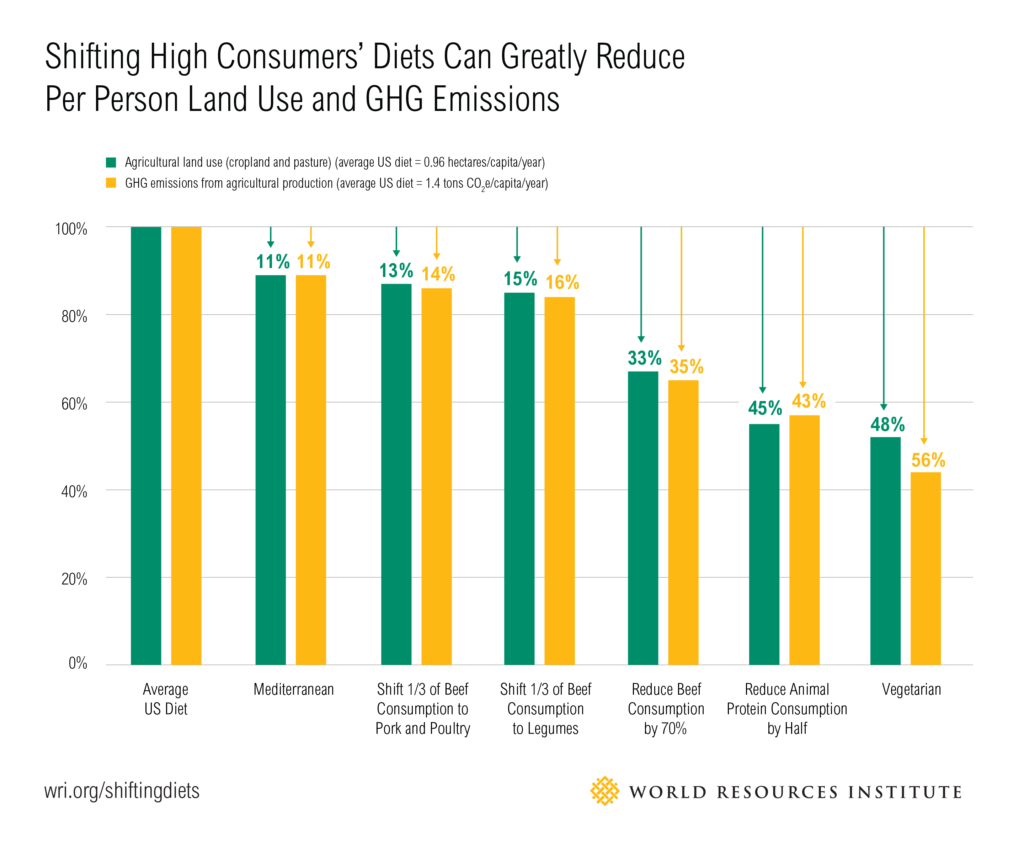When we were young, the sport utility vehicle (SUV) was the prototypical example of Western culture’s growing environmental destruction. And the result of this? The iconic Hummer SUV was replaced in many garages by the now iconic and hyper efficient Toyota Prius. And how did we measure this efficiency? We made a new metric for automobile environmental impact: miles per gallon (MPG).
Since then, many studies have been piling up about other facets of our environmental footprint. As it turns out, our food choices are right up there with our transportation choices. Every bite of food we consume incurs hidden environmental costs, and some foods require more (a lot more!) resources than others. However, calculating this fact is not easy – there are a ton of variables that change based on the region, farming methods, and many other factors – which is why there really isn’t a standard MPG equivalent.
That being said, the best and most up-to-date resource I’ve seen is the World Resources Institute 2016 report on Shifting Diets for a Sustainable Food Future. The report analyzes the impact of various foods per gram of protein or calorie, which is close to giving consumers something close to MPG. And holy cow – these numbers are mesmerizing. Check it out….
Using the WRI data, let’s take a look at what the average American does to their environmental footprint when they hit the road to becoming a Plant Eater.
Reduce Red Meat: 15% Reduction in GHG
The first step is to simply replace 1/3 of red meat with other types of animal protein. Every third burger, simply swap the beef patty for something (anything!) else. Beef production requires 20 times more land and emits 20 times more greenhouse gas emissions per unit of edible protein than common plant-based protein sources such as beans, peas and lentils (shown as “pulses” above). While chicken and pork are more resource-efficient than beef, they still require three times more land and emit three times more greenhouse gas emissions than beans. So let’s continue down the road…
Reduce Animal Products by Half: 35-43% Reduction in GHG
Another progressive option shown below is to reduce overall animal consumption by 50%, which can result in a 43% reduction in impact. I think this option is an important one for us to think about because it has the greatest chance of catching on the U.S. and other high-emitting cultures. In other words, I think there’s more hope in billions of meat eaters reducing their meat consumption than an equivalent reduction by millions of people going fully vegan.
Go Vegetarian or Vegan: 50-60% Reduction in GHG
Kicking meat altogether gets us to a 50% reduction in impact. Unfortunately, the WRI data leaves out the last few steps on the road to becoming a plant eater: a plant-based diet. By my math, switching out dairy and eggs for would get us somewhere in the neighborhood of a 60% reduction in environmental impact!

The power we hold in our forks is just amazing. One final thing to note here is that GHG and land use as shown above are only 2 important metrics in the whole environmental equation. There is also water use, species loss through habitat destruction, erosion, oceanic dead zones, and many more. The most comprehensive resource I’ve seen on this topic is the documentary Cowspiracy.
Maybe soon we can replace the villain-hood of the gas-guzzling SUV with the villain-hood of the steakhouse? And MPG with GHG/gram of protein? Or gallons of water per gram of protein? Or can we aggregate all factors into one MPG-like score? Only time will tell… come-on scientists!